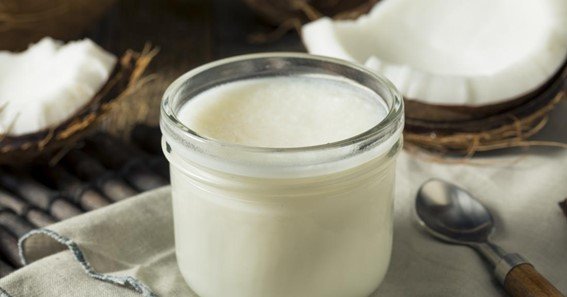Coconut oil is widely celebrated for its moisturizing and nourishing qualities, making it a popular choice for skincare, haircare, and even cooking. But is vitamin E present in coconut oil? Vitamin E is known for its powerful antioxidant and skin benefits, so finding it in coconut oil would be an added advantage. In this article, we’ll explore the vitamin E content in coconut oil, its nutritional value, and its role in promoting healthy skin and hair.
Is Vitamin E Present in Coconut Oil?
Yes, vitamin E is present in coconut oil, although in small amounts. While coconut oil is rich in healthy fats, particularly medium-chain triglycerides (MCTs), it contains lower levels of vitamin E compared to other oils like olive oil or sunflower oil. Despite its lower vitamin E content, coconut oil still offers some antioxidant benefits and provides protective qualities for the skin and hair.
Understanding the nutritional value of coconut oil can help clarify why it’s so popular in skincare and health routines, even with a modest vitamin E presence.
Vitamin E Content in Coconut Oil
The vitamin E content in coconut oil is relatively low. On average, coconut oil contains about 0.1 mg of vitamin E per tablespoon, which is modest compared to other oils like sunflower oil (with around 5 mg per tablespoon). However, the combination of vitamin E and other antioxidants in coconut oil can still benefit skin and hair, particularly when used topically.
For those looking to maximize their vitamin E intake, combining coconut oil with other vitamin E-rich oils can be an effective approach.
Nutritional Value of Coconut Oil
Coconut oil is well-known for its high saturated fat content, mainly composed of medium-chain fatty acids, which are easily absorbed and metabolized by the body. Key components of the nutritional value of coconut oil include:
- Lauric Acid: Known for its antibacterial and antifungal properties, lauric acid is a primary fatty acid in coconut oil.
- Caprylic and Capric Acid: These fatty acids support immune health and provide anti-inflammatory benefits.
- Antioxidants: Coconut oil contains small amounts of antioxidants, including vitamin E, that help combat free radicals.
Despite its limited vitamin E content, coconut oil’s other nutrients make it valuable for skin, hair, and health.
Benefits of Vitamin E in Coconut Oil for Skin Health
Even with its small amount, the benefits of vitamin E in coconut oil contribute to skin protection and hydration. Here’s how it helps:
- Antioxidant Protection: Vitamin E and other antioxidants in coconut oil work together to protect the skin from environmental damage and free radicals.
- Moisture Retention: Vitamin E’s hydrating properties combine with coconut oil’s fatty acids to lock in moisture, making it ideal for dry or sensitive skin.
- Soothing Irritated Skin: Vitamin E can help soothe inflammation and reduce redness, while coconut oil’s antibacterial properties aid in healing.
These skin benefits of coconut oil make it a gentle yet effective option for skincare routines.
Coconut Oil and Skin Health
Coconut oil is widely known for its ability to nourish and protect the skin, even with its modest vitamin E content. Here’s why coconut oil and skin health go hand-in-hand:
- Moisturizing Properties: Coconut oil’s natural fats create a protective barrier on the skin, keeping it hydrated and soft.
- Anti-Inflammatory Benefits: Coconut oil helps reduce redness and irritation, making it suitable for sensitive or inflamed skin.
- Antimicrobial Protection: Lauric acid in coconut oil provides a layer of protection against bacteria, making it useful for acne-prone skin.
Incorporating coconut oil into your skincare routine can boost moisture levels and provide gentle protection.
Coconut Oil vs. Other Oils for Vitamin E
When comparing coconut oil vs. other oils for vitamin E, it’s clear that coconut oil has lower vitamin E levels than options like sunflower, olive, or almond oil. Oils like sunflower oil contain higher concentrations of vitamin E and may be better for those looking for a more potent antioxidant boost.
That said, coconut oil’s combination of fatty acids, antioxidants, and moisturizing properties still makes it a beneficial choice, particularly for those who prefer natural skincare products.
FAQ
1. Is vitamin E present in coconut oil?
Yes, coconut oil contains vitamin E, but only in small amounts compared to other oils like olive or sunflower oil.
2. How does the vitamin E content in coconut oil benefit skin health?
The vitamin E in coconut oil provides antioxidant protection, aids in moisture retention, and helps soothe irritated skin.
3. Can coconut oil replace other vitamin E-rich oils?
Coconut oil can be a good moisturizer and antioxidant source, but for higher vitamin E content, consider combining it with oils like sunflower or almond oil.
4. Is coconut oil safe for all skin types?
Coconut oil is generally safe for most skin types, but people with oily or acne-prone skin should use it sparingly, as it can be comedogenic.
5. How does coconut oil compare to other oils for vitamin E content?
Coconut oil has lower vitamin E content than many other oils, but its other nutrients, like lauric acid, provide additional skin benefits.
Conclusion
So, is vitamin E present in coconut oil? Yes, though in modest amounts. While coconut oil may not be the richest source of vitamin E, its combination of antioxidants, fatty acids, and skin-nourishing properties make it a valuable addition to skincare routines. By understanding the benefits of vitamin E in coconut oil and comparing it with other oils, you can make informed choices about incorporating it into your daily care routine for optimal skin health.










